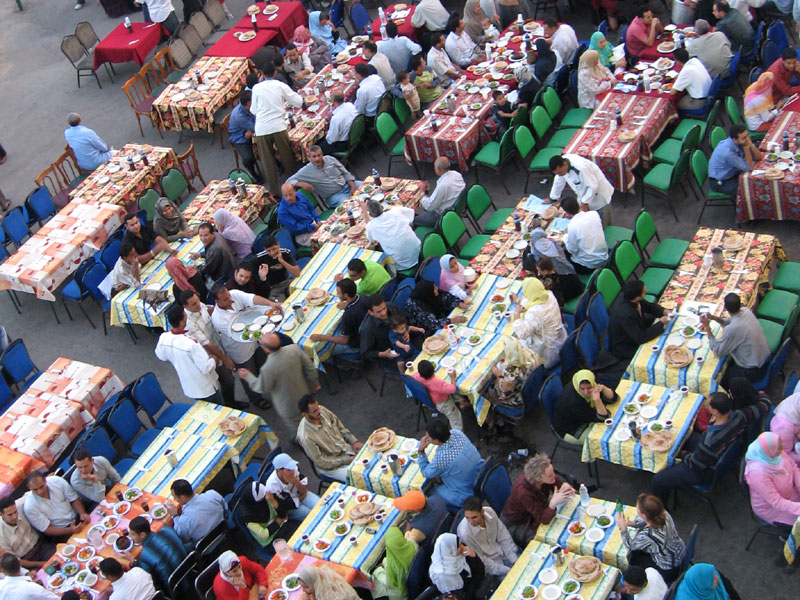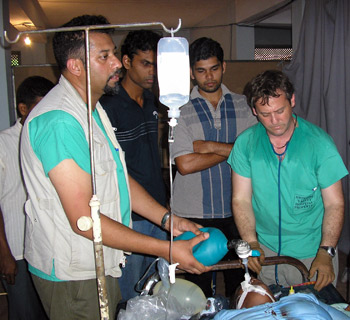Happy Ramadan!
Month of Fasting About Which So Many Know So Little

This year, as with every year in Central Coast, Ramadan began with the typical ritual of media silence. Just as the pages of periodicals were lacking feature stories about the month-long fast, there were no pre-Ramadan sales in the shops, or trees being lit, or decorations being hung throughout the downtown areas. Instead, in the community at large, the yearly routine of cultural invisibility once again returned. One would think that an annual habit of people avoiding food or drink, anger and arguments, sex and sin for 16 hours each day for 30 days would at very least be a curiosity if not newsworthy.
In the hopes of breaking the silence, I thought I would share a few words about the fasting month about which so many know so little. The tradition of fasting is steeped in Abrahamic history. In addition to Yom Kippur, there are six Tzomot (traditional days of fasting) in the Jewish tradition. Matthew 4:2 relates that Jesus (peace and blessings be upon him) fasted 40 days and 40 nights and was hungry.” In turn, Muslims follow this Abrahamic custom as related in Sura 2, verse 183, of the Quran: “O you who believe! Fasting is prescribed upon you as it was prescribed on those before you, so that you may learn self-restraint.” Ramadan is also commemorated by Muslims as it represents the month in which the Quran was initially revealed to Prophet Muhammad (PBUH) in the year 610. The 30 days of back-to-back fasting culminate with a period of celebration known as “Eid-ul-Fitr.”
Though the majority of 1.6 billion Muslims worldwide fast during Ramadan, there are many exemptions. Children, the infirm, the elderly, or women who are pregnant, breast-feeding, or menstruating are all exempt from fasting. Traditionally those employing this dispensation feed the poor and avoid eating or drinking in the presence of those keeping the fast.
The Islamic month of fasting is not just limited to the exclusion of food and water for two-thirds of the day, but extends to everything from curbing sexual desire, to self-censure, to feeding and tending to the needs of the poor. Ramadan is a month of physical, mental, and spiritual endurance training, a veritable worldwide religious Ironman competition, run by hundreds of millions worldwide.
Fasting begins every day with a predawn meal known in Arabic as suhur. The fast is initiated with a personal intention to fast solely for the sake of God. For the rest of the day, Muslims go about their usual daily business, taking short breaks to complete ritual prayers. The fast is broken each evening as the sun dips below the horizon. The Muslim call to prayer is melodiously recited, and, in a tradition going back 1400 years, Muslims break their fast with a few dates and draft of water or milk. This iftar as it is called is a wonderful opportunity for family or community members to meet and “break bread.” It is said of Abraham that he never ate a meal alone. Perhaps if more Muslims followed the example of their patriarch, by inviting those from other faiths to break iftar with them, they would be better understood and supported as part of the fabric of our nation.
Likewise, for Christians and Jews who have a Muslim friend, take a moment to wish them Ramadan karim (may the rewards of your fast be generous). In a time when Muslims are unfairly stigmatized, a few gentle words during this month of self-denial will bring a welcome smile to their parched and hungry lips.

Rushdi Abdul Cader is a physician, the medical director of the San Luis Obispo Region Swat Team, and a volunteer emergency medical officer with the International Medical Corps. He has been an active member of the Muslim community for 25 years.



